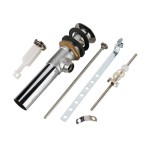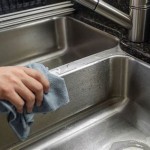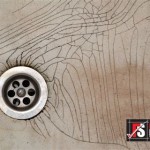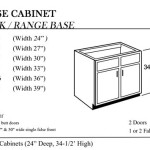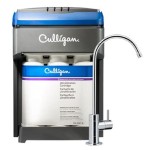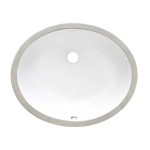Best Materials for a Sink
Choosing the right sink material is an important decision when renovating or building a kitchen or bathroom. The sink is a focal point in these spaces, and its material impacts not only its aesthetics but also its durability, functionality, and even its maintenance requirements. Each material brings its own set of advantages and disadvantages, so understanding these factors is crucial for making an informed choice.
Stainless Steel: The Classic Choice
Stainless steel remains a popular choice for sinks due to its versatility, durability, and affordability. It's known for its resistance to rust, scratches, and heat. Stainless steel sinks are also easy to clean and maintain, making them a practical option for busy households. They come in a variety of finishes, including brushed, satin, and polished, allowing for customization to suit various design aesthetics.
However, stainless steel can be susceptible to water spots and fingerprints, especially with lighter finishes. It can also be noisy when water impacts the surface. To mitigate these issues, consider choosing sinks with a thicker gauge of stainless steel or opting for a sound-dampening undercoating.
Cast Iron: Durability and Elegance
Cast iron sinks, often coated with porcelain enamel, are known for their exceptional durability and resilience to scratches and impacts. Their thick construction provides a solid and substantial feel, adding a touch of elegance to any kitchen or bathroom. Cast iron sinks are also highly resistant to heat and stains, making them ideal for heavy use.
While cast iron offers excellent durability, it's considerably heavier than other materials, making installation more challenging. Their smooth porcelain enamel surface can also be susceptible to chipping or cracking with rough treatment. Additionally, cast iron sinks tend to be more expensive than stainless steel alternatives.
Composite Sinks: A Blend of Durability and Aesthetics
Composite sinks are manufactured by combining different materials, often a blend of acrylic or resin with natural materials like granite, quartz, or limestone. This combination results in sinks with a unique blend of durability, aesthetic appeal, and affordability. Composite sinks are known for their resistance to scratches, stains, and heat, while offering a wide range of colors and patterns to complement different design styles.
However, composite sinks can be more porous than other materials, potentially requiring more frequent cleaning to prevent staining. They are also not as heat-resistant as stainless steel or cast iron, so using trivets for hot pots and pans is recommended.
Copper: A Touch of Luxury
Copper sinks offer a unique blend of beauty and practicality. Their warm, metallic sheen adds a touch of luxury to any space. Copper is naturally antibacterial and antimicrobial, making it a hygienic option for kitchens and bathrooms. It's also highly durable and resistant to scratches and dents.
Despite its advantages, copper is a more expensive choice compared to other sink materials. It requires regular cleaning and polishing to maintain its luster and prevent oxidation. Copper sinks can also be susceptible to discoloration and patina formation over time, which some homeowners find aesthetically pleasing while others prefer a more polished look.
Fireclay: A Modern and Durable Option
Fireclay sinks are crafted from a clay mixture that is fired at high temperatures, resulting in a durable and heat-resistant material. They offer a smooth, easy-to-clean surface and come in a variety of colors and finishes. Fireclay sinks are known for their durability and resistance to scratches, stains, and heat. They also tend to be quieter than stainless steel sinks.
Fireclay sinks are relatively expensive compared to many other options. While durable, they can be susceptible to chipping or cracking with rough treatment. Additionally, they can be heavier than other sink materials, making installation more challenging.
Choosing the Right Material
Ultimately, the best material for a sink depends on individual needs and preferences. Consider factors such as budget, desired aesthetics, durability requirements, and maintenance preferences. Researching the pros and cons of each material, exploring different finishes and colors, and consulting with a professional plumber or kitchen designer can help make an informed decision that meets your specific needs.
14 Best Kitchen Sink Materials For Ultimate Durability Style Vevano

How To Choose The Best Material For Your Kitchen Sink Tap Warehouse

Top 5 Kitchen Sink Materials Sinkology

Top 5 Kitchen Sink Materials Sinkology
14 Best Kitchen Sink Materials For Ultimate Durability Style Vevano

3 Best Types Of Kitchen Sink Materials On The Market Today Green Art
Bathroom Sink Material Ing Guide Signature Hardware

9 Best Kitchen Sink Materials Pros Cons

Which Kitchen Sink Material Is Best Stonecover Quartz Surfaces

Which Are The Best Kitchen Sinks Scavolini Magazine
